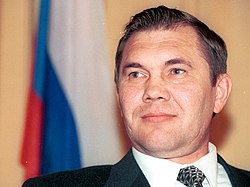Alexander Lebed
| Alexander Lebed | |
|---|---|

Lebed at a news conference at Moscow in October 1996.
|
|
| National Security Advisor to the President of Russia | |
| Secretary of the Security Council | |
|
In office 1996–1996 |
|
| Preceded by | Oleg Lobov |
| Succeeded by | Ivan Rybkin |
| Governor of Krasnoyarsk Krai | |
|
In office 1998–2002 |
|
| Preceded by | Valery Zubov |
| Succeeded by | Alexander Khloponin |
| Personal details | |
| Born |
Alexander Ivanovich Lebed April 20, 1950 Novocherkassk, Soviet Union |
| Died | April 28, 2002 (age 52) Abakan, Russian Federation |
| Political party | Congress of Russian Communities |
| Spouse(s) | Inna Lebed |
| Profession | Soldier |
| Awards |
Order of the Red Banner Order of the Red Star Order for Service to the Homeland in the Armed Forces of the USSR (2nd and 3rd class) |
| Military service | |
| Allegiance |
Soviet Union Russian Federation |
| Service/branch | VDV |
| Years of service | 1969-1995 |
| Rank | Lieutenant general |
| Commands |
106th Guards Tula Airborne Division 14th Guards Army |
| Battles/wars |
War in Afghanistan Conflict in Transnistria and Gagauzia |
Alexander Ivanovich Lebed (Russian: Алекса́ндр Ива́нович Ле́бедь; April 20, 1950 – April 28, 2002) was a Russian military officer and politician. He placed third in the 1996 Russian presidential election, with 14.5% of the vote nationwide. He later served as Russia's Secretary of the Security Council and as governor of Krasnoyarsk Krai, Russia's second largest region. He served four years in the latter position, until his death, following a Mi-8 helicopter crash.
Lebed joined the Soviet Army's VDV airborne troops in 1969. He spent eight years as company leader at the VDV officer school in Ryazan, then served as battalion commander with distinction in the War in Afghanistan from 1981 to 1982 before becoming a regimental commander.
In 1982-1985 he studied in Frunze Military Academy, Moscow. Among his duties was being a member of the Funeral Department during the period of many deaths among the Soviet , including three Soviet rulers.
At the rank of colonel, Lebed led airborne troops during the Soviet internal crises in Azerbaijan in 1988 and 1990 (Black January), and in Georgia in 1989. The latter included the brutal dispersing of a pro-independence rally at a government building in Tbilisi, leaving twenty people dead.
Lebed commanded the 106th Airborne Division from 1988 to 1991. He received national attention after the Soviet Coup of 1991, in which a conspiracy of government members opposing the perestroika had sought the overthrow of Mikhail Gorbachev's government and the reversal of some of his liberalizing political reforms. At the height of the crisis, the Army had been ordered by the coup participants to surround the White House, the seat of the parliament of the Russian SFSR. General Lebed was given orders to send tanks but never took any action against the parliamentarians and Boris Yeltsin, the president of Russian SFSR.
...
Wikipedia
